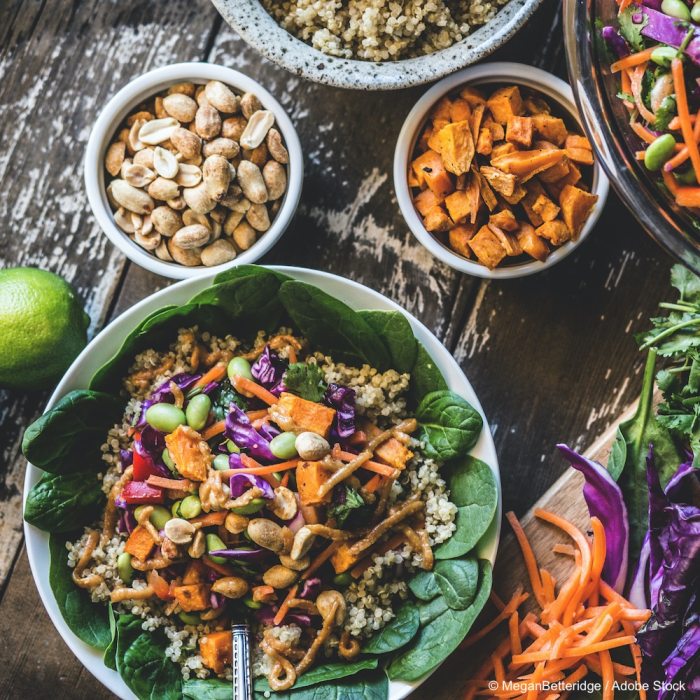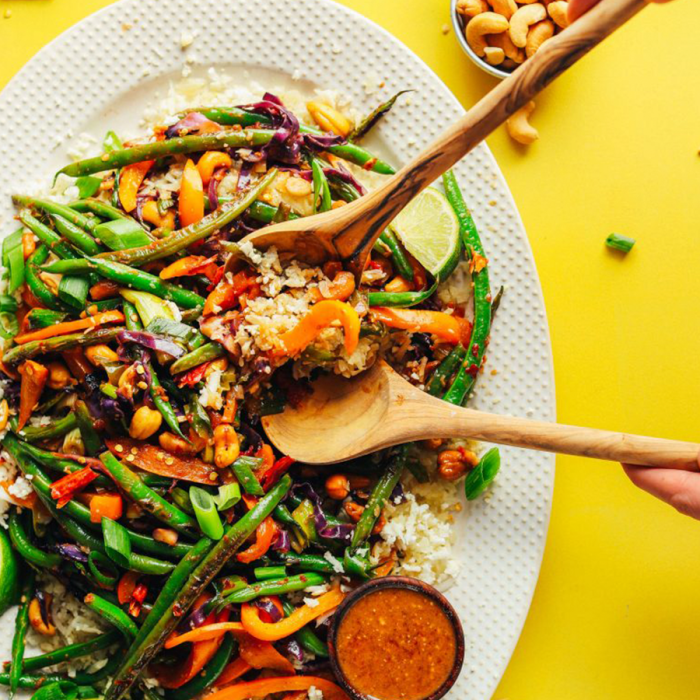Plant-based recipes are gaining popularity as people become more aware of the health and environmental benefits of a plant-based diet. This comprehensive guide will provide you with everything you need to know about plant-based recipes, from the basics of a plant-based diet to creative and innovative recipes that will inspire you to cook more plant-based meals.
Whether you’re a seasoned vegan or just starting to explore plant-based eating, this guide has something for you. We’ll cover the basics of a plant-based diet, including the different types of plant-based diets and the health benefits of eating more plants. We’ll also provide you with a variety of plant-based recipes for different meals and cuisines, including appetizers, main courses, side dishes, and desserts.
Plant-based Diets
Plant-based diets emphasize the consumption of plant-derived foods, including fruits, vegetables, whole grains, legumes, and nuts. These diets exclude or limit animal products, such as meat, poultry, fish, eggs, and dairy.
Plant-based diets offer several potential health benefits, including:
- Reduced risk of chronic diseases, such as heart disease, stroke, type 2 diabetes, and some types of cancer.
- Improved weight management.
- Increased intake of fiber, vitamins, and minerals.
- Lower environmental impact.
Types of Plant-based Diets
There are several types of plant-based diets, each with varying levels of restriction on animal products:
- Vegan: Excludes all animal products, including meat, poultry, fish, eggs, dairy, and honey.
- Vegetarian: Excludes meat, poultry, and fish, but may include eggs, dairy, and honey.
- Flexitarian: Primarily plant-based, but occasionally includes small amounts of animal products.
Common Plant-based Foods
Common plant-based foods include:
- Fruits: Apples, bananas, berries, oranges, etc.
- Vegetables: Broccoli, cauliflower, carrots, spinach, etc.
- Whole grains: Brown rice, quinoa, oats, whole-wheat bread, etc.
- Legumes: Beans, lentils, peas, chickpeas, etc.
- Nuts and seeds: Almonds, walnuts, chia seeds, flax seeds, etc.
Plant-based Recipes
Plant-based recipes offer a diverse range of culinary delights that cater to various dietary preferences and taste buds. These recipes harness the nutritional richness of plant-based ingredients to create flavorful and satisfying dishes that promote well-being.
The versatility of plant-based cooking allows for the creation of a wide array of dishes, from appetizers to desserts. Each recipe is carefully crafted to balance flavors, textures, and nutritional value, ensuring a satisfying and wholesome dining experience.
Appetizers
Plant-based appetizers provide a tantalizing start to any meal. These bite-sized delights are designed to whet the appetite and offer a burst of flavor. Some popular plant-based appetizer recipes include:
- Vegetable Spring Rolls: Crisp spring rolls filled with an assortment of fresh vegetables, served with a savory dipping sauce.
- Hummus with Pita Chips: Creamy and flavorful hummus made from chickpeas, tahini, and spices, paired with crispy pita chips for dipping.
- Guacamole with Tortilla Chips: A classic Mexican dip made from ripe avocados, lime juice, and spices, served with crunchy tortilla chips.
Main Courses, Plant-based recipes
Plant-based main courses offer a satisfying and nutritious alternative to meat-based dishes. These recipes are packed with protein, fiber, and essential nutrients, ensuring a well-rounded meal.
- Lentil Curry: A hearty and flavorful curry made with lentils, vegetables, and aromatic spices, served over rice or quinoa.
- Black Bean Tacos: Tacos filled with seasoned black beans, topped with fresh vegetables and salsa.
- Vegetable Stir-Fry: A vibrant and colorful stir-fry featuring an assortment of vegetables, tofu, and a savory sauce.
Side Dishes
Plant-based side dishes complement main courses and add variety to the meal. These dishes provide additional nutrients and flavors to enhance the dining experience.
- Roasted Vegetables: A medley of roasted vegetables, such as carrots, potatoes, and broccoli, seasoned with herbs and spices.
- Quinoa Salad: A refreshing and nutritious salad made with cooked quinoa, fresh vegetables, and a light dressing.
- Mashed Sweet Potatoes: Creamy and comforting mashed sweet potatoes, flavored with spices and a touch of sweetness.
Desserts
Plant-based desserts offer a sweet and satisfying end to any meal. These recipes utilize natural sweeteners and plant-based ingredients to create guilt-free indulgences.
Plant-based recipes, catering to individuals seeking a healthier lifestyle, offer a wide range of culinary options. For those new to cooking or seeking approachable recipes, Recipes for beginners provide a comprehensive guide to navigate the world of plant-based cooking. With clear instructions and a focus on simplicity, these recipes empower beginners to create delicious and nutritious plant-based meals.
- Chocolate Avocado Pudding: A rich and creamy pudding made from ripe avocados, cocoa powder, and natural sweeteners.
- Banana Nice Cream: A frozen dessert made from blended frozen bananas, creating a smooth and creamy texture.
- Fruit Crisp: A warm and comforting dessert featuring a fruit filling topped with a crunchy oat crumble.
Health Benefits of Plant-based Recipes

Plant-based recipes are gaining popularity due to their numerous health benefits. These recipes emphasize the use of plant-derived ingredients, such as fruits, vegetables, whole grains, legumes, and nuts, which are rich in essential nutrients.
Research has consistently shown that plant-based diets can significantly reduce the risk of chronic diseases, including heart disease, diabetes, and cancer. This is primarily attributed to the high fiber, antioxidant, and phytochemical content of plant foods.
Cardiovascular Health
Plant-based recipes are rich in soluble fiber, which has been shown to lower cholesterol levels and improve blood pressure. They also contain antioxidants, such as vitamin C and E, which protect against oxidative damage and inflammation, key contributors to heart disease.
Plant-based recipes offer a diverse range of culinary options for those seeking healthy and sustainable meal choices. Whether it’s a festive gathering or an intimate celebration, plant-based dishes can elevate any special occasion. Recipes for special occasions often feature innovative plant-based ingredients and cooking techniques that cater to a wide array of dietary preferences and tastes.
From tantalizing appetizers to delectable desserts, plant-based recipes can create a memorable dining experience that is both indulgent and guilt-free.
- A study published in the Journal of the American Medical Association found that a plant-based diet was associated with a 24% lower risk of heart disease compared to a non-vegetarian diet.
- Another study, published in the American Journal of Clinical Nutrition, showed that a vegetarian diet significantly reduced blood pressure and cholesterol levels in individuals with high blood pressure.
Diabetes Prevention and Management
Plant-based recipes are naturally low in glycemic index, which means they release glucose slowly into the bloodstream, helping to regulate blood sugar levels. They are also rich in fiber, which slows down digestion and absorption of carbohydrates, further improving glycemic control.
- A study published in the journal Diabetes Care found that a plant-based diet was associated with a 57% lower risk of developing type 2 diabetes.
- Another study, published in the American Journal of Epidemiology, showed that a high intake of fruits, vegetables, and whole grains was associated with a reduced risk of type 2 diabetes in women.
Cancer Prevention
Plant-based recipes are rich in antioxidants, phytochemicals, and other bioactive compounds that have been shown to have anti-cancer properties. These compounds can help protect cells from damage, reduce inflammation, and inhibit tumor growth.
- A study published in the journal JAMA Internal Medicine found that a high intake of fruits and vegetables was associated with a 15% lower risk of all-cause cancer.
- Another study, published in the International Journal of Cancer, showed that a vegetarian diet was associated with a 22% lower risk of colon cancer.
Challenges and Tips for Cooking Plant-based Recipes
Embarking on a plant-based culinary journey presents unique challenges that test the creativity and culinary prowess of home cooks. Overcoming these hurdles requires a blend of culinary techniques, ingredient knowledge, and a willingness to experiment. This comprehensive guide delves into the common pitfalls encountered in plant-based cooking and equips you with practical tips and expert advice to navigate these challenges seamlessly.
Achieving Desired Flavors
Plant-based ingredients often lack the inherent richness and umami found in animal products. To compensate, chefs employ various techniques to enhance flavors:
- Seasoning and Marinating: Liberally season dishes with herbs, spices, and marinades to infuse them with depth and complexity.
- Roasting and Caramelizing: Roasting vegetables and tofu caramelizes their natural sugars, creating a rich and savory flavor.
li>Using Umami-rich Ingredients: Incorporate ingredients like mushrooms, miso paste, and nutritional yeast to add a savory and umami boost.
Creating Satisfying Textures
Meat substitutes often fail to replicate the texture of animal products. To achieve satisfying textures in plant-based dishes:
- Combining Different Ingredients: Use a combination of ingredients, such as lentils, beans, and vegetables, to create a variety of textures.
- Blending and Pureeing: Blending or pureeing ingredients creates smooth and creamy textures, ideal for soups, sauces, and dips.
- Using Textured Vegetable Proteins (TVPs): TVPs are plant-based ingredients that mimic the texture of meat when rehydrated.
Creative Plant-based Recipes
Plant-based cooking has evolved beyond traditional dishes, embracing innovation and creativity. Chefs and home cooks alike are experimenting with unique ingredients, cooking methods, and presentation techniques to create exciting and flavorful plant-based recipes.
These innovative recipes showcase the versatility and potential of plant-based cuisine, inspiring home cooks to explore new culinary possibilities and create their own unique dishes.
Unique Ingredients
- Jackfruit: A tropical fruit with a meaty texture, ideal for creating vegan pulled pork, tacos, and curries.
- Hearts of palm: A vegetable that resembles artichoke hearts, often used in salads, soups, and pasta dishes.
- Nutritional yeast: A deactivated yeast with a cheesy flavor, commonly used as a seasoning or topping in vegan dishes.
Innovative Cooking Methods
- Sous vide: A cooking technique that involves vacuum-sealing food and cooking it in a temperature-controlled water bath, resulting in tender and flavorful dishes.
- Fermentation: A process that uses microorganisms to break down carbohydrates, creating unique flavors and textures in plant-based foods such as tempeh, kimchi, and kombucha.
- Molecular gastronomy: A scientific approach to cooking that involves using techniques such as spherification and foams to create visually stunning and innovative dishes.
Creative Presentation Techniques
- Plating: Arranging food on a plate in an aesthetically pleasing manner, using colors, textures, and shapes to create visual interest.
- Carving: Using specialized knives and techniques to create intricate designs and patterns in fruits and vegetables, such as watermelon carvings or radish roses.
- Molecular gastronomy: Employing techniques such as foams and spherification to create visually stunning and innovative presentations.
Last Word

If you’re looking to improve your health, reduce your environmental impact, or simply try something new, plant-based recipes are a great place to start. With so many delicious and nutritious options available, there’s no reason not to give plant-based eating a try.
FAQ Section
What are the benefits of a plant-based diet?
A plant-based diet has many benefits, including reducing the risk of heart disease, stroke, type 2 diabetes, and some types of cancer. It can also help you lose weight, improve your digestion, and boost your energy levels.
What are some common plant-based foods?
Common plant-based foods include fruits, vegetables, whole grains, legumes, nuts, and seeds. These foods are all packed with nutrients and antioxidants that are essential for good health.
How can I make plant-based recipes more flavorful?
There are many ways to make plant-based recipes more flavorful. Some tips include using a variety of spices and herbs, adding a squeeze of lemon or lime juice, or using a flavorful plant-based broth or stock.


